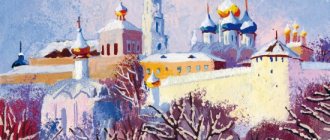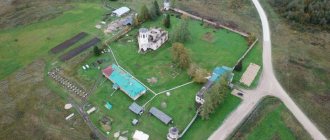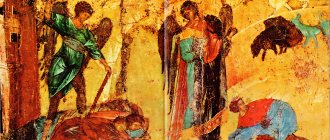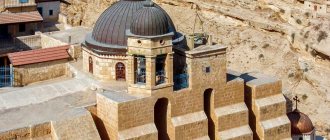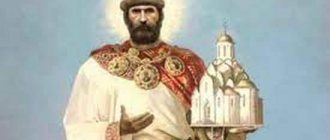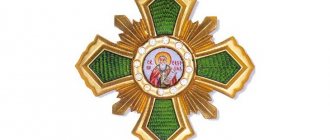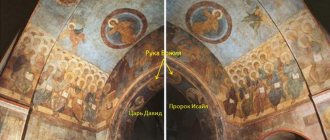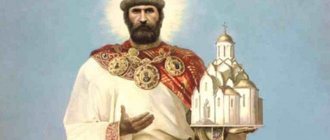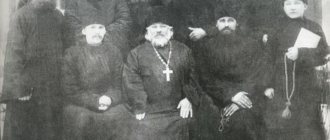The life and walk of Abbot Daniel from the Russian Land
And this is about the holy light: how it descends to the Holy Sepulcher. The Lord gave this to me, a bad and unworthy servant, to see. And I truly saw with my sinful eyes how the holy light descended to the life-giving Tomb of our Lord Jesus Christ. Many wanderers tell lies about the descent of the holy light: after all, one says that the Holy Spirit descends like a dove to the Holy Sepulcher, and others say: lightning descends from heaven, and there the lamps are lit over the Holy Sepulcher. And that is a lie and not true, because then nothing is visible - neither a dove, nor lightning. But so, invisibly, He descends from heaven by the grace of God and lights the lamps in the Holy Sepulcher. Yes, and I’ll tell you about this as I saw it, truly.
On Good Friday, after Vespers, they wipe the Holy Sepulcher, and wash all the lamps, and pour in pure oil without water - only that oil. And having stuck the lamps into the tins, they do not light those lamps, but leave those lamps unlit. And they seal the Coffin at two o'clock in the morning. And then all the lamps and candles in all the churches in Jerusalem are extinguished.
Then I, bad and unworthy, on that Friday at one o’clock in the afternoon, went to that prince Baldwin and bowed to him to the ground. He, seeing me, bad, called me to him with love and said to me: “What do you want, Russian abbot?” He got to know me well and loved me very much, because he is a virtuous husband, very humble, and not at all proud. I told him: “My prince, my lord! I pray to you for the sake of God and the princes for the sake of the Russians: command me that I too place my lamp on the Holy Sepulcher from all the Russian land!” Then he seriously and lovingly ordered me to place the lamp on the Holy Sepulcher, and sent with me my husband, his best servant, to the steward of the Church of the Holy Resurrection and to the one who holds the key to the Sepulcher. And the steward and the steward of the Holy Sepulcher commanded me to bring my lamp with oil. I, having bowed to them, went with great joy and bought a glass lamp, very large, and, pouring it full of pure oil, brought it to the Holy Sepulcher, when evening had already come. I begged the housekeeper, who was then alone inside the Tomb, and promised him something, and he opened the holy doors for me, ordered me to take off my boots, and so, barefoot, he led me alone into the Holy Sepulcher with the lamp that I carried with me, and ordered me to put the lamp on the Holy Sepulcher myself. And I placed it with my sinful hands at the feet - where the most pure feet of our Lord Jesus Christ lay. For at the head stood a Greek lamp, and on the chest was placed the lamp of St. Sava and all the monasteries. After all, this is the custom here: every year they put up a Greek lamp and Saint Sava. And by the grace of God those three lamps lit up then; and the Fryazhsk lamp was hung on top, but not one of them caught fire.
I then, having placed a lamp on the Holy Sepulcher, and bowed to that honorable Sepulcher, and kissed with love and with tears the holy place where the body of our Lord Jesus Christ lay, left the Holy Sepulcher with great joy and went to my cell.
The next day, on Holy Saturday at six o'clock in the afternoon, all the people gather in front of the Church of the Holy Resurrection - countless people, residents of that land and strangers from all countries: from Babylon, and from Egypt, and from all ends of the earth. An untold multitude gathers there that day. And all those places near the church and near the Crucifixion of Christ are filled with people; and there is great crowding and cruel crush among the people there, so that many people then suffocate from the crowdedness of the countless people. And those people all stand with unlit candles and wait for the church doors to open. Then only the priests are inside the church. And the priests and all the people wait until the prince comes with his retinue; and then the church doors open, and people enter the church in great crowds and crushes, and fill that church and choir. Everything is done in full, for all the people cannot fit into that church, but a lot of people remain outside the church near Golgotha and near the Extreme Place, and right up to the place where the crosses were found, and all this is done completely by countless numbers of people. And all those people in the church and outside the church say nothing else, only: “Lord, have mercy!” they cry unremittingly and shout loudly, so that the whole place hums and thunders from the cry of those people. And here the tears of the faithful people flow in streams. Even with a heart of stone, a person can then shed tears. For everyone then looks into himself and remembers his sins, and everyone says to himself: “Is it really because of my sins that the holy light will not come down?” And so all the faithful people stand in tears with broken hearts. And that Prince Baldwin himself stands with great fear and humility, and streams miraculously flow from his eyes. Also, his squad stands next to him opposite the Sepulcher, near the large altar; and they all stand with humility.
And when the seventh hour of the Sabbath day came, then Prince Baldwin went to the Holy Sepulcher with his retinue from his house; Everyone went on foot. And the prince sent Saint Sava to the place, and called the abbot of that Saint Sava with his monks. And the abbot went with the brethren to the Holy Sepulcher, and I, thin, immediately went with that abbot and the brethren. And we approached that prince, and we all bowed to him. Then he bowed to the abbot and all the brethren, and ordered the abbot of St. Sava and me, the thin one, to go next to him, and he ordered the other abbots and monks to all go in front of him, and ordered his squad to go behind.
And we came to the Church of the Resurrection of Christ, to the western doors. And so many people closed the doors of the church, and then we could not enter the church. Then Prince Baldwin gave the order to the soldiers, and they forcibly dispersed the people and made, as it were, a street all the way to the Tomb, and then we were able to walk between the people straight to the Tomb. And we approached the eastern doors of the Holy Sepulcher, and the prince came up behind us and stood in his place on the right side at the barrier of the great altar opposite the eastern doors and the doors of the Holy Sepulcher, for here is the prince’s place, built high.
And the prince ordered the abbot of St. Sava to stand over the tomb with his monks and the Orthodox priests. He ordered me, the bad one, to be placed high above the very doors of the Sepulchre, opposite the great altar, so that I could look into the doors of the Sepulcher. All three doors of the Tomb were sealed, and sealed with the royal seal. The Latin priests stood in the great altar. And when the eighth hour of the day arrived, the Orthodox priests, and the monks, and all the spiritual men began to sing vespers on the Tomb above; and there were many hermits here; The Latins in the great altar began to squeal in their own way. And so they all sang, and I stood here, diligently looking at the doors of the Tomb. And when they began to read the paremias of that Great Saturday, during the first paremia the bishop and the deacon came out of the great altar, approached the doors of the Sepulcher, and looked into the Sepulcher through the sacrum of those doors, and did not see the light in the Sepulcher, and returned to their place. And when they began to read the sixth proverb, the same bishop approached the door of the Sepulcher and again saw nothing. And then all the people cried out with tears, “Kyrie, eleison!”, which means “Lord, have mercy!” And when the ninth hour passed and they began to sing the passage song “We sing to the Lord,” then suddenly a small cloud came from the east and stood over the uncovered top of that church, and a little rain fell over the Holy Sepulcher, and wetted us well, standing on the Sepulcher. And then suddenly the holy light shone in the Holy Sepulcher: a terrible and bright brilliance came out of the Holy Sepulcher of the Lord. And approaching, the bishop with four deacons opened the doors of the Tomb, and took a candle from that prince, from Baldwin, and with it entered the Tomb, and first of all he lit the prince’s candle from that holy light. Having taken that candle out of the Tomb, he gave it to the prince himself in his hands. And the prince stood in his place, holding the candle with great joy. And from him we all lit our candles, and from our candles all the people lit their candles throughout the church, lighting candles from each other.
The holy light is not like earthly fire, but miraculously, shining differently, unusually; and its flame is red as cinnabar; and glows absolutely unspeakably.
And so all the people stand with burning candles, and all the people cry out loudly, “Lord, have mercy!” with great joy and joy. Such joy cannot be experienced by a person in any other case, what kind of joy does every Christian have who has seen the holy light of God. And whoever did not experience that joy on that day does not believe those who talk about everything he saw. However, wise and faithful people willingly believe and joyfully listen to the story about this true event and about these holy places. He who is faithful in small things is faithful in many things, but to an evil person, an unfaithful person, the true appears crooked. For me, the bad one, God is my witness, and the Holy Sepulcher, and all the companions, the Russian sons who happened there that day, the Novgorodians and Kyivians: Izyaslav Ivanovich, Gorodislav Mikhailovich Kashkich and many others who know about me, the bad one, and about this story. But let's return to the interrupted story.
When the light shone in the Holy Sepulcher, then the singing stopped, and everyone exclaimed: “Kyrie, eleison!”, and they left the church with burning candles and with great joy, keeping their candles so that the wind would not extinguish them, and each of them walked back home. And from that holy light they light lamps in their churches and finish the evening singing in their homes. And in the great church at the Holy Sepulcher the priests themselves, alone without people, finish the evening singing. Then we, the abbot and the brethren, went to our monastery, carrying burning candles, and there we finished the evening singing, and went to our cells, praising God, who gave us, unworthy, to see this grace of God.
And at Matins on Holy Sunday, having sung the matins service, and after kissing the abbot and the brethren, after absolution, which took place at one o’clock in the afternoon, taking up the cross, the abbot and all the brethren went to the Holy Sepulcher, singing this kontakion: “Although in the tomb come down, immortal!” And having entered the Holy Life-Giving Sepulcher, they kissed the Holy Sepulcher with love and with warm tears and here they enjoyed the fragrant aroma of the coming of the Holy Spirit; and the lamps still burned brightly and wonderfully. Those three lamps were lit then, as the steward and the steward of the Holy Sepulcher told us. Turning to the abbot, they both said: “Below, standing on the Holy Sepulcher, those three lamps lit up.” And five other lamps hang over the Tomb; but they burned then, although their light was different, not the same as that of those three lamps, unusually and miraculously glowing.
And then we left the Tomb by the eastern doors and, entering the great altar, kissed the Orthodox there, and, after absolution, the abbot and the brethren, we left the Church of the Holy Resurrection, and went to our monastery, and there we rested until the liturgy.
And three days after the Resurrection of the Lord, according to the liturgy, we went to the key keeper of the Holy Sepulcher, and I told him: “I would like to take my lamp.” He received me with love and brought me alone into the Tomb. And entering the Tomb, I saw my lamp standing on the Holy Tomb and still burning with that holy light. And I bowed to that Holy Sepulcher and kissed with love and tears that holy place where the most pure body of our Lord Jesus Christ lay. And then I myself measured the Coffin in length, width and height, such as it was; It’s impossible for anyone to measure it in front of people. And I honored the Holy Sepulcher according to my strength as best I could, and gave that housekeeper something a little, as well as my bad blessing. He, seeing my love for the Holy Sepulcher, then moved away the tablet located in the heads of the Holy Sepulcher, and separated me from that holy stone with a small blessing, forbidding me with an oath to speak about it to anyone in Jerusalem. I bowed to the Holy Sepulcher and the keeper of the key and, taking my lamp with the holy oil, left the Holy Sepulcher with great joy, enriched by the grace of God, carrying in my hand the gift of the holy place and the sign of the Holy Sepulcher, and walked, rejoicing like some treasure of wealth carrying. He went to his cell, rejoicing with great joy.
And God is witness to this, and the Holy Sepulcher of the Lord, that, being in all the holy places, I did not forget the names of Russian princes and princesses, and their children, bishops, abbots and boyars, and my spiritual children; and I never forgot all Christians; but he commemorated him in all holy places. First of all, I bowed for the princes for everyone, and then I prayed for my sins. And for this I praise the good God, who granted me, the bad one, the names of the Russian princes to write in the Lavra of St. Sava; and now their names are remembered in litany, with their wives and their children. Here are their names: Mikhail-Svyatopolk, Vasily-Vladimir, David Svyatoslavich, Mikhail-Oleg, Pankraty Svyatoslavich, Gleb Minsky. I only remembered their names, so I wrote them down. In addition to all the Russian princes, I prayed for the boyars at the Holy Sepulcher and in all the holy places. And we sang liturgies for the Russian princes and for all Christians - fifty liturgies in total, and forty liturgies for the departed.
May all who read this scripture with faith and love receive a blessing from God, and from the Holy Sepulcher, and from all the places of these saints: they will receive a reward from God on an equal basis with those who walked to these places of saints. Blessed are those who have seen and believed, and thrice blessed are those who have not seen who believe. Believing, Abraham came to the Promised Land. Truly, faith is equal to good works.
For God's sake, my brothers and masters, do not reproach me for my feeble-mindedness and my rudeness. May this scripture not be desecrated for my sake, and for the Holy Sepulcher, and for the sake of the saints of these places. Whoever reads it with love, may he receive his reward from God our Savior Jesus Christ. And the God of peace be with you all forever - Amen.
Mysterious monk - biography of Hegumen
History has preserved very little information about Abbot Daniel himself. But most scientists believe that he lived in the second half of the 11th - early 12th centuries. Born in the Chernigov province, he entered the Kiev-Pechersk Monastery. There he eventually became abbot. Then he was ordained to the rank of bishop. It is also known that he died in the fall of 1122.
Hegumen Daniel himself made the pilgrimage to the Holy Land in 1104-1006. He writes very little about himself; this is not customary among monks. Their destiny is to pray in the silence of their cell, saving not only their souls, but also performing the feat of prayer for everyone who calls themselves believers.
Awards
- Gaiter (1998)
- pectoral cross (2000)
- Medal of St. Sergius of Radonezh, 1st degree (2001)
- certificate of gratitude (December 22, 2003)
- blessed certificate (2005)
- diploma (2010, for hard work in the field of spiritual and moral enlightenment and education)
- Mace (2011)
- medal "In memory of the 200th anniversary of the victory in the Patriotic War of 1812" (2012)
- Medal "For Sacrificial Labor" III degree (2014)
- medal of the Moscow diocese “For diligent service”, II degree (July 20, 2014) [20]
- medal “In memory of the 1000th anniversary of the repose of Equal-to-the-Apostles Grand Duke Vladimir” (2015)
- medal "In memory of the 100th anniversary of the restoration of the Patriarchate in the Russian Orthodox Church" (2017)
